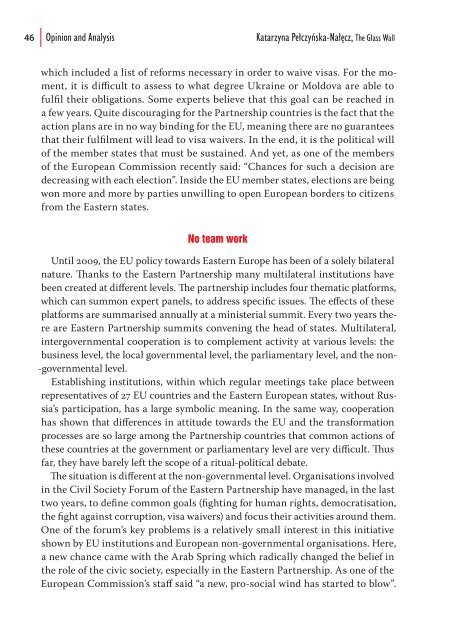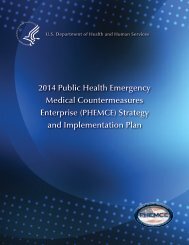Create successful ePaper yourself
Turn your PDF publications into a flip-book with our unique Google optimized e-Paper software.
46<br />
Opinion and Analysis Katarzyna Pełczyńska-Nałęcz, The Glass Wall<br />
which included a list of reforms necessary in order to waive visas. For the moment,<br />
it is diffi cult to assess to what degree Ukraine or Moldova are able to<br />
fulfi l their obligations. Some experts believe that this goal can be reached in<br />
a few years. Quite discouraging for the Partnership countries is the fact that the<br />
action plans are in no way binding for the EU, meaning there are no guarantees<br />
that their fulfi lment will lead to visa waivers. In the end, it is the political will<br />
of the member states that must be sustained. And yet, as one of the members<br />
of the <strong>Europe</strong>an Commission recently said: “Chances for such a decision are<br />
decreasing with each election”. Inside the EU member states, elections are being<br />
won more and more by parties unwilling to open <strong>Europe</strong>an borders to citizens<br />
from the <strong>Eastern</strong> states.<br />
No team work<br />
Until 2009, the EU policy towards <strong>Eastern</strong> <strong>Europe</strong> has been of a solely bilateral<br />
nature. Th anks to the <strong>Eastern</strong> Partnership many multilateral institutions have<br />
been created at diff erent levels. Th e partnership includes four thematic platforms,<br />
which can summon expert panels, to address specifi c issues. Th e eff ects of these<br />
platforms are summarised annually at a ministerial summit. Every two years there<br />
are <strong>Eastern</strong> Partnership summits convening the head of states. Multilateral,<br />
intergovernmental cooperation is to complement activity at various levels: the<br />
business level, the local governmental level, the parliamentary level, and the non-<br />
-governmental level.<br />
Establishing institutions, within which regular meetings take place between<br />
representatives of 27 EU countries and the <strong>Eastern</strong> <strong>Europe</strong>an states, without Russia’s<br />
participation, has a large symbolic meaning. In the same way, cooperation<br />
has shown that diff erences in attitude towards the EU and the transformation<br />
processes are so large among the Partnership countries that common actions of<br />
these countries at the government or parliamentary level are very diffi cult. Th us<br />
far, they have barely left the scope of a ritual-political debate.<br />
Th e situation is diff erent at the non-governmental level. Organisations involved<br />
in the Civil Society Forum of the <strong>Eastern</strong> Partnership have managed, in the last<br />
two years, to defi ne common goals (fi ghting for human rights, democratisation,<br />
the fi ght against corruption, visa waivers) and focus their activities around them.<br />
One of the forum’s key problems is a relatively small interest in this initiative<br />
shown by EU institutions and <strong>Europe</strong>an non-governmental organisations. Here,<br />
a new chance came with the Arab Spring which radically changed the belief in<br />
the role of the civic society, especially in the <strong>Eastern</strong> Partnership. As one of the<br />
<strong>Europe</strong>an Commission’s staff said “a new, pro-social wind has started to blow”.



